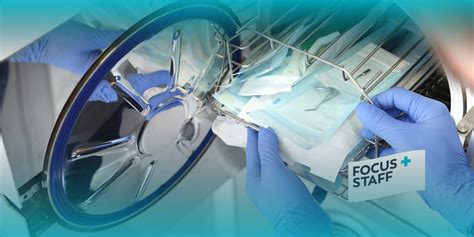Are you a Sterile Processing Technician looking for a change of pace and a chance to explore new places? Or perhaps you're looking for a way to combine your passion for travel with your career in Sterile Processing? If so, becoming a travel Sterile Processing Tech might be the perfect opportunity for you.
As a travel Sterile Processing Tech, you'll have the chance to work in different hospitals and medical facilities across the country, while also experiencing new cultures and environments. But, you might be wondering, how do I get started? In this article, we'll guide you through the process of becoming a travel Sterile Processing Tech, from the basics of Sterile Processing to the requirements and benefits of travel assignments.
What is Sterile Processing?
Sterile Processing, also known as Central Service or Central Supply, is a critical department in hospitals and medical facilities responsible for the cleaning, disinfecting, and sterilizing of medical equipment and supplies. Sterile Processing Technicians play a vital role in ensuring that medical instruments are safe for use on patients, and that the risk of infection is minimized.
Sterile Processing involves several key steps, including:
- Decontamination: removing dirt, blood, and other substances from medical instruments
- Cleaning: washing and rinsing medical instruments to remove any remaining debris
- Disinfecting: using chemicals to kill bacteria and other microorganisms on medical instruments
- Sterilizing: using heat, steam, or other methods to kill all microorganisms on medical instruments
- Packaging: preparing sterilized instruments for use in medical procedures
Why Become a Travel Sterile Processing Tech?
There are many reasons why becoming a travel Sterile Processing Tech can be a great career move. Here are just a few:
- Flexibility: As a travel Sterile Processing Tech, you'll have the opportunity to work in different locations, choose your own assignments, and set your own schedule.
- Variety: Traveling to different hospitals and medical facilities will give you the chance to experience new environments, meet new people, and face new challenges.
- Financial Benefits: Travel Sterile Processing Techs are often paid higher rates than permanent staff, and may also receive benefits such as housing stipends, meal allowances, and travel reimbursement.
- Personal Growth: Traveling and working in new locations can be a great way to develop new skills, build confidence, and expand your professional network.
How to Become a Travel Sterile Processing Tech
To become a travel Sterile Processing Tech, you'll need to meet the following requirements:
- Education and Training: You'll need to have a high school diploma or equivalent, and complete a training program in Sterile Processing. Many community colleges and vocational schools offer programs in Sterile Processing.
- Certification: Certification is highly recommended for Sterile Processing Technicians. The most common certification is the Certified Registered Central Service Technician (CRCST) credential, offered by the International Association of Healthcare Central Service Materiel Management (IAHCSMM).
- Experience: Most travel staffing agencies require at least 1-2 years of experience in Sterile Processing. This experience can be gained through permanent positions or other travel assignments.
- Licensure: Some states require licensure for Sterile Processing Technicians. You'll need to check with the state you're interested in working in to see if licensure is required.
What to Expect as a Travel Sterile Processing Tech
As a travel Sterile Processing Tech, you can expect to work in a variety of hospitals and medical facilities, including:
- Hospitals: Large teaching hospitals, community hospitals, and specialty hospitals
- Surgical Centers: Ambulatory surgical centers and outpatient surgical centers
- Clinics: Medical clinics, dental clinics, and veterinary clinics
- Other Facilities: Nursing homes, rehabilitation centers, and long-term care facilities
Your day-to-day responsibilities will include:
- Sterilizing Equipment: Using autoclaves, sterilizers, and other equipment to sterilize medical instruments
- Cleaning and Disinfecting: Cleaning and disinfecting medical instruments, equipment, and supplies
- Packaging and Storage: Packaging sterilized instruments and storing them in a clean and dry environment
- Quality Control: Monitoring the quality of sterilized instruments and reporting any issues to management
Benefits of Working with a Travel Staffing Agency
Working with a travel staffing agency can be a great way to find travel Sterile Processing Tech assignments. Here are just a few benefits:
- Job Placement: Travel staffing agencies have relationships with hospitals and medical facilities across the country, and can help place you in a travel assignment that meets your needs.
- Housing and Transportation: Many travel staffing agencies offer housing stipends, meal allowances, and travel reimbursement to help you get settled in your new location.
- Pay and Benefits: Travel staffing agencies often offer competitive pay rates and benefits, such as health insurance, retirement plans, and paid time off.
- Support: Travel staffing agencies can provide support and guidance throughout your assignment, including assistance with licensure, certification, and continuing education.

Conclusion
Becoming a travel Sterile Processing Tech can be a great way to combine your passion for travel with your career in Sterile Processing. With the right education, training, and experience, you can start exploring new locations and experiencing new cultures. Whether you're looking for flexibility, variety, or financial benefits, becoming a travel Sterile Processing Tech can be a great career move.
Gallery of Sterile Processing Technicians






What is the average salary for a Sterile Processing Technician?
+The average salary for a Sterile Processing Technician can vary depending on location, experience, and other factors. According to the Bureau of Labor Statistics, the median annual salary for Sterile Processing Technicians was $43,610 in May 2020.
Do I need a certification to become a Sterile Processing Technician?
+Certification is highly recommended for Sterile Processing Technicians. The most common certification is the Certified Registered Central Service Technician (CRCST) credential, offered by the International Association of Healthcare Central Service Materiel Management (IAHCSMM).
How long does it take to become a Sterile Processing Technician?
+The length of time it takes to become a Sterile Processing Technician can vary depending on the individual's prior experience and education. Typically, a training program in Sterile Processing can take several months to a year to complete.
